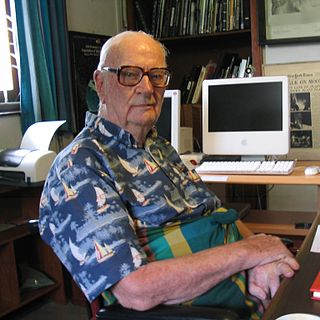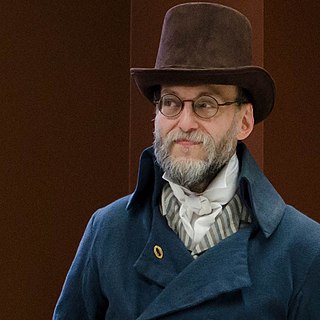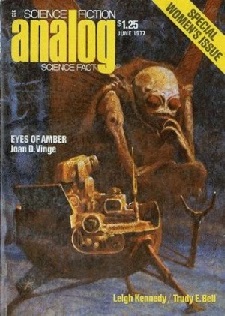
Hard science fiction is a category of science fiction characterized by an emphasis on scientific accuracy. The term was first used in print in 1957 by P. Schuyler Miller in a review of John W. Campbell's Islands of Space in the November issue of Astounding Science Fiction. The complementary term soft science fiction, formed by analogy to hard science fiction, first appeared in the late 1970s. The term is formed by analogy to the popular distinction between the "hard" (natural) and "soft" (social) sciences. Science fiction critic Gary Westfahl argues that neither term is part of a rigorous taxonomy; instead they are approximate ways of characterizing stories that reviewers and commentators have found useful.

Kim Stanley Robinson is an American writer of science fiction. He has published nineteen novels and numerous short stories but is best known for his Mars trilogy. His work has been translated into 24 languages. Many of his novels and stories have ecological, cultural, and political themes running through them and feature scientists as heroes. Robinson has won numerous awards, including the Hugo Award for Best Novel, the Nebula Award for Best Novel and the World Fantasy Award. Robinson's work has been labeled by The Atlantic as "the gold-standard of realistic, and highly literary, science-fiction writing." According to an article in The New Yorker, Robinson is "generally acknowledged as one of the greatest living science-fiction writers."

Leigh Douglass Brackett was an American writer, particularly of science fiction, and has been referred to as the Queen of Space Opera. She was also a screenwriter, known for her work on such films as The Big Sleep (1946), Rio Bravo (1959), The Long Goodbye (1973) and The Empire Strikes Back (1980). She was the first woman shortlisted for the Hugo Award.

Geoffrey Alan Landis is an American scientist, working for the National Aeronautics and Space Administration (NASA) on planetary exploration, interstellar propulsion, solar power and photovoltaics. He holds nine patents, primarily in the field of improvements to solar cells and photovoltaic devices and has given presentations and commentary on the possibilities for interstellar travel and construction of bases on the Moon, Mars, and Venus.
David Pringle is a Scottish science fiction editor.
James Davis Nicoll of Kitchener, Ontario, is a freelance game and speculative fiction reviewer, former role-playing game store owner, and also works as a first reader for the Science Fiction Book Club. As a Usenet personality, Nicoll is known for writing a widely quoted epigram on the English language, as well as for his accounts of suffering a high number of accidents, which he has narrated over the years in Usenet groups like rec.arts.sf.written and rec.arts.sf.fandom. He is now a blogger on Dreamwidth and Facebook, and an occasional columnist on Tor.com. In 2014, he started his website, jamesdavisnicoll.com, dedicated to his book reviews of works old and new; and later added Young People Read Old SFF, where his panel of younger readers read pre-1980 science fiction and fantasy, and Nicoll and his collaborators report on the younger readers' reactions.
"Allamagoosa" is a science fiction short story by English author Eric Frank Russell, originally published in the May 1955 issue of Astounding Science Fiction and collected in The Best Of Eric Frank Russell (1978) and Major Ingredients: The Selected Short Stories of Eric Frank Russell (2000).
Galaxy novels, sometimes titled Galaxy Science Fiction Novels, were a series of mostly reprint American science fiction novels published between 1950 and 1961.

The Flying Sorcerers is a humorous 1971 science fiction novel by American writers David Gerrold and Larry Niven. It was originally serialized in 1970 as The Misspelled Magishun in If magazine.
"Knock", is a science fiction short story by American writer by Fredric Brown. It starts with a short-short story based on the following text of Thomas Bailey Aldrich:
IMAGINE all human beings swept off the face of the earth, excepting one man. Imagine this man in some vast city, New York or London. Imagine him on the third or fourth day of his solitude sitting in a house and hearing a ring at the door-bell!

Mary Rosenblum was an American science fiction and mystery author.

David D. Levine is an American science fiction writer who won the Hugo Award for Best Short Story in 2006 for his story "Tk'tk'tk". His novel, Arabella of Mars, was published by Tor Books in July 2016.

Richard Wilson was an American science fiction writer and fan. He was a member of the Futurians, and was married at one time to Leslie Perri.

Rocket to the Morgue is a 1942 American locked room mystery novel by Anthony Boucher.

James S. A. Corey is the pen name used by collaborators Daniel Abraham and Ty Franck, authors of the science fiction series The Expanse. The first and last name are taken from Abraham's and Franck's middle names, respectively, and S. A. are the initials of Abraham's daughter. The name is also meant to emulate many of the space opera writers of the 1970s. In Germany, their books are published under the name James Corey with the middle initials omitted.

"Eyes of Amber" is a science fiction short story by American writer Joan D. Vinge. It was first published as the cover story for the June 1977 issue of Analog Science Fiction and Fact.














